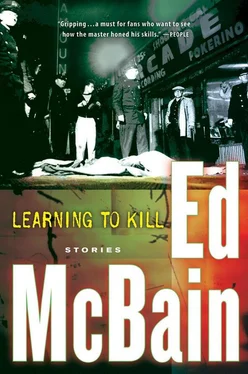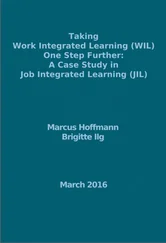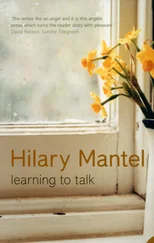He saw the look in the first cop’s eyes. That same look was mirrored on the second cop’s face. He saw, too, the irrefutable logic there. Angelo had been gunned down. Angelo was scum, but he was a citizen of this fair city. Someone had gunned him, and it was like tagging someone for a parking violation. Some big boy upstairs would raise six kinds of hell if this sort of thing went on, people cluttering up the streets with worthless garbage like Angelo. There was only one way to handle a case of this exceptional caliber. Pull in the nearest sucker. Take Johnny because he was as neat a patsy as the next guy, all made to order with an attempted rape on his sister, and a knock-down-drag-out right on 125th, where Angelo had done his best to kill him.
Whatever you do, avoid trouble on your beat. Squelch trouble on your beat. Step on trouble.
Step on Johnny Trachetti.
He read the logic. You can’t fight logic. He didn’t try to.
He brought his knee up into the groin of the first cop, and then clobbered him on the back of the head with both hands squeezed together like the head of a mallet. The cop fell to the pavement like a pile of manure, and his buddy unsnapped the Police Special hanging in the holster near his right buttock. The shot rang out on the crisp autumn air, but Johnny was already behind the squad car, ducking around the grille, heading for the door near the driver’s seat. He knew it was crazy, and he knew you didn’t go around driving cops’ cars, but taking the rap for Angelo’s kill was just as nuts, and he had nothing to lose now, not after the logic he had read.
He heard the second shot, and the third one, but he was already behind the wheel, his head ducked low, his hand re-leasing the emergency brake, his foot on the accelerator. The car leaped ahead, and then the shots came like bursts from a tommy gun, fast and sharp, pinging against the sides of the car.
He heard the first cop banging his nightstick against the pavement, and the pounding was as loud and as frightening as the bark of the other cop’s gun. The last bullet found one of the rear tires, and the car lurched crazily, but he held on to the wheel and kept his foot pressed to the floor, and the rubber flapped and beat the asphalt as he headed for 116th. The cop had stopped to reload, and by the time the next shots came, he couldn’t have hit him if he’d been using a bazooka. He drove down to the York Avenue exit, wondering whether or not he should turn on the siren, a little excited about all of it now, a little reckless-feeling.
He ditched the car, and then ran like a thief up to First Avenue, cutting back uptown. He reached 116th Street, wondered where he should go then. Back home? That was the first place they’d look.
He stood on the corner, looking up toward the Third Avenue El, wondering. When he saw the squad car pull around Second Avenue, he made up his mind, and he made it up fast.
He didn’t run this time. He walked casually, his head turned toward the shop windows that lined the wide street. The corset shop was in the middle of the street, between Second and Third. The plate-glass window carried the fancy legend FOUNDATION GARMENTS, but everybody knew this was the corset shop, and everybody knew it was run by Gussie the Corset Lady.
He walked into the shop quickly. The front room was stacked with dummies wearing brassieres and girdles and corsets and contraptions he couldn’t name. He’d worked for Gussie a long time ago, when he was fifteen, delivering the garments to fat women who should have ordered pants with zippers instead. He heard the hum of the sewing machine in the back room, and he looked out at the street once and then parted the flowered curtains and stepped out of sight.
Gussie looked up from the machine. She was a tall woman in her early fifties, with large brown eyes and full, sensuous lips. She wore her own foundation garments, and she was wearing one now that bunched her full breasts up into the low yoke of her neckline, like the heroine on the jacket of a historical novel.
“Well!” she said. “Who’s after you?”
“The cops,” Johnny said quickly.
She’d been smiling, but the smile dropped from her face now. “What do you mean, the cops? What for?”
“They say I killed Angelo Brancusi.”
“He’s dead?” Gussie asked. She nodded her head emphatically. “Good. He deserved it.”
“Yeah, but I didn’t do it.”
“I didn’t say you did. No matter who did it, he deserved it.”
Johnny glanced through the curtains and out at the street again. “I ran away from them,” he said. “They were planning a run-through. I don’t like working on a railroad.”
“You shouldn’t have run. That was stupid.”
“All right, it was stupid. You didn’t see their eyes.”
Gussie stared at him contemplatively for a few moments. “Why’d you come to me?” she asked.
“Just to get off the streets. You don’t have to worry, I’m leaving.”
Gussie’s face was worried now.
“What are you going to do?” she asked.
“I don’t know. How do I know? Just stay away from them for now, that’s all.”
“And then what?”
“Somebody killed Angelo,” he said. “That’s for sure.”
“They’ll catch you,” she said. “And it’ll be worse because you ran away.”
“I also slugged a cop and stole a squad car. I got nothin’ to lose now.”
“Stay until dark,” Gussie said suddenly. “Stay here in the back.”
“Thanks,” he said.
“I’m only saving my own skin. If the cops think...”
“Don’t spoil it,” Johnny said. “I was beginning to think you were human.”
“Go to hell, you snot nose,” Gussie said, but she was smiling.
He saw the lights come on in the church across the street, saw the streetlamps throw their dim rays into the gathering October darkness. The clock on the wall in Gussie’s front room read five ten. The lights all along the street came on, warm yellow lights that built a solid, cozy front against the crisp near-winter blackness.
“You’d better get started,” she said. “We’re lucky they haven’t been here yet.”
“I ditched the car on York,” he told her. “They probably figure I headed downtown.”
“Go through the back way,” Gussie said. “You can cut through the yard and climb the fence. That way you’ll come out on a Hun’ fifteenth. Less lights.”
“All right,” he said. He hesitated, biting his lip. “You got money?”
“A little.”
Gussie walked to a chair and unhooked a black leather purse from where it hung. “This’ll help a little. Things haven’t been too good lately.”
She handed him the sawbuck, and he hesitated before taking it. “You don’t have to...”
“Angelo broke my window once,” she said simply.
“Well, thanks a lot.”
She nodded and he left by the back door, cutting into the concrete alleyway behind the apartment building. He knew there would be steps now leading to the sidewalk. He remembered the times when he and the other kids used to duck down behind the steps like this on his own block, whenever they were too busy or too rushed to look for a toilet.
He passed the garbage cans and the familiar sharp stench. It was dark there where the steps dropped down into the bowels of the tenement. He saw the iron railing up ahead of him on the sidewalk, and the dangling chain that was supposed to stop kids from parading up and down the steps, but which only served as an impromptu swing. He started up the steps, and when he collided with the other man he almost shrieked in terror.
He heard a dull clatter as something dropped to the steps and then rolled away into the blackness near the garbage cans. His fists balled immediately and he waited, hearing the other man’s hoarse breathing. He figured the guy for a wino or a stumblebum, or maybe a degenerate.
Читать дальше












